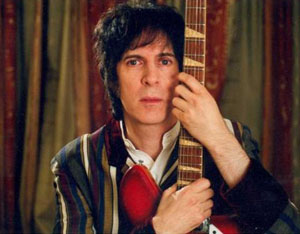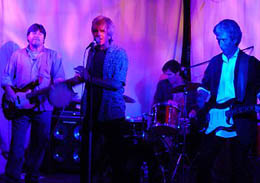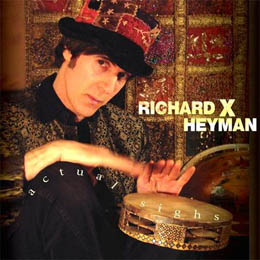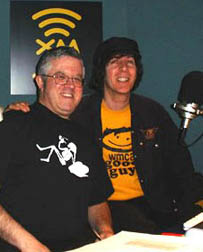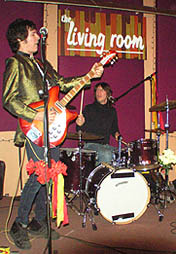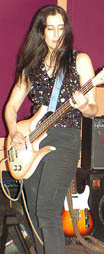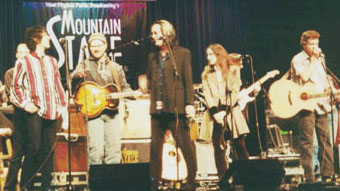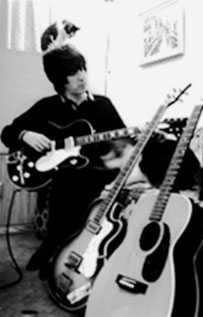| Richard
X Heyman : |
|||||||||||||||||||||||
|
|
At first glance, you think you’ve just bumped into Ray Davies of the Kinks. You expect a waft of that pleasant Patchouli-Frangipani incense, maybe hear the strains of a Donovan melody lapping in gentle waves behind you from a heyday fondly remembered. When you blink again, you realize it’s the fresh pleasant gust visually and musically of Richard X. Heyman, a songwriter / musician / percussionist par excellence who brings a rich heritage of groove and mixes it with the future in his inimitable way. For sure, he neatly bow-ties the past and the present together, with maybe a wink to the future in style and composition, and so he’s definitely in the groove and movin’ it ever forward. The Empress is just chilled and thrilled to bring you RXH – like man, his renaissance is now.
Q: It’s been stated about you that, "Richard started banging on things when he was five, got a full drum kit when he was seven, and was astounding audiences with his chops by the time he was twelve. He picked up guitar and piano in his teens, which was also when original songs started popping into his head." In that light, what do you think you were inspired by –– music you were listening to? Music coming from somewhere inexplicably inside you? A Mozartian type-thing that runs in the family? Some people are born natural dancers, do you think you were born with an innate gift or sense of rhythm waiting to emerge? Exactly how many instruments do you play? Who do you consider were the greatest influences on your own style and approach in terms of drumwork and keyboard? RXH: Life has its mysteries. One big question in my own life is how and why I knew I should and could play the drums at such an early age. The desire was internal and instinctive. No one in my family was particularly musical, although my parents enjoyed listening to music and had a wide variety of records in our home. My exposure to drumming and music in general was through those albums. I heard many original Broadway show soundtracks, my favorites being "My Fair Lady" and "West Side Story" along with a host of Rodgers musicals. A lot of jazz, such as Louis Armstrong and Benny Goodman, as well as classical LPS were at home –– I loved the New York Philharmonic’s version of Gershwin’s "Rhapsody In Blue" and "An American In Paris" and Aaron Copland’s "Appalachian Spring." There were a lot of Sinatra LP’s, too. Having three older sisters gave me a head start with rock’n’roll - Chuck Berry, James Brown, Little Richard, Ricky Nelson, Dion and the Belmonts, the early Beach Boys, plus many of the top 40 singles of the day. Visually I saw a lot of music on TV. There were many variety shows on the air when I was a kid. You’d see Duke Ellington’s band and Count Basie, Sinatra, Tony Bennett, mixed in with the rockers like the Everly Brothers who were big favorites of mine. Also living close to New York City, my parents took me in to see Broadway musicals, which had quite an impact. My main instrument is the drums and related percussion such as congas, timbale, timpani, doumbek, xylophone and vibraphone. I play piano, harpsichord, organ and a variety of electric keyboards, as well as acoustic and electric guitar, banjo, harmonica, recorder and bass. My first drum hero was Gene Krupa. Then I got into Buddy Rich and Louie Bellson and Elvin Jones. I learned a lot of piano technique by listening to Joni Mitchell on her "Ladies of the Canyon" and "Blue" albums. I also love Ray Charles, Dave Brubeck, Floyd Kramer and Ramsey Lewis. For rock drumming, I’d say Hal Blaine, Ringo Starr, Charlie Watts, Dino Dannelli, B.J. Wilson, Keith Moon, Mitch Mitchell and Bobby Elliot.
Q: About your own compositions over the years, it has been noted that, "...there are the ones that have lived on in both Richard’s and wife/bassist Nancy’s musical memories, many of them written in the Actual Size era, that have survived the test of time -- the ones whose moment has finally come. Richard felt it was time to give these early works -- plus the original six tracks from Actual Size --another shot at the limelight. The royal RXH treatment. Altogether, they comprise Actual Sighs, Richard’s ‘would-have-been’ first album. So here you have it, the resuscitated, rejuvenated Actual Size, now re-christened Actual Sighs, boasting twenty songs –––– re-recordings of the original six plus fourteen more newly recorded tunes. Produced by Richard and engineered by Nancy, the tracks were mixed by Ed Stasium (an old New Jersey friend of Richard's who gained international recognition for his work with such luminaries as The Ramones, The Smithereens, Living Colour and Marshall Crenshaw) and long-time Heyman engineer Tony Lewis, who’‘s mixed Richard’‘s previous three releases." Is this your signature album, the one that reveals and defines who you are as a songwriter and musician? Where did many of the songs come from -- personal experience, outsider observation, wishes or dreams, emotions of any kind? Feel free to expand at length. Is there any one song that you can say truly means the most to you for whatever reasons? RXH: "Actual Sighs" consists of songs I wrote in the 70's and early 80's. These songs would have comprised my debut album had I had the resources back then. They were put away when I finished my first release –– a six song EP entitled "Actual Size." I simply ran out of money to record them, and by the time I began my follow-up recording, called "Living Room!!", I had selected a completely different batch of songs, new things I had been writing and some older ones. So this album, "Actual Sighs," is a bit of a time capsule, or a snapshot of my early songs. Songwriting for me is an emotional outlet. The melodies can pop into my head at unexpected times - just walking around the city or noodling at the piano or on the guitar. I never sit down and intentionally decide to write a song. Lyrically, I use whatever life experience I’ve had, or I try to step outside and write from a bystander’s perspective. I have occasionally dreamed songs. "The Gallery" from "Actual Sighs" came initially from dreams. From "Actual Sighs," "The Gazing Moon" has a lot of meaning for me. The lyrics are a lament. Here we are, given this unbelievable opportunity as human beings to inhabit this planet, and we muck it up with selfishness, hatred and violence. The moon can only watch from its perch. [Editor’s note: Yes, we can sigh in agreement, RXH.]
Q: If you had to categorize your music, what would it be? Rock, pop, electronic, crossover, or are you more eclectic? RXH: I certainly don’t want to get into the name game. It’s not that I’m anti-semantic – I just think the music should speak for itself. People can call it whatever suits their needs and requirements. My next album is going to be very acoustic piano-based material, not even rock per se. I haven’t a clue what kind of label to give it, though. I do understand that it’s human nature to want some structure and organization, so I suppose that’s why people like to have categories. Q: Has internet radio opened up whole new audiences to your music? What conventional radio airplay do you prefer to receive? RXH: The internet in general, radio, websites, downloads, etc., has changed the music business radically. It is simply amazing how music can be heard and acquired through a computer. I have many new listeners around the world who probably would never have heard my stuff if it wasn’t for internet radio, MySpace, YouTube and the rest. As for conventional airplay, I welcome terrestrial and extra-terrestrial –– I want everyone!
Q: You’ve done such diverse incredible things like play keyboard for Ben E. King, had Peter Noone (Herman & the Hermits) sing on one of your albums, and have drummed for Brian Wilson (The Beach Boys). Did you come away with from those experiences enriched, and if so how, in terms of jamming, grooving, learning, etc. What were the things that struck you musically about each of these legends in terms of their professionalism, their talents, their personalities? RXH: There’s an old adage in sports, especially one-on-one sports like tennis, that you will play better if you play with someone really good or better than yourself. The same is true in music. Also, the saying "nothing is created in a vacuum" applies. Having the experience of performing with other musicians is enriching and invaluable. Peter Noone and Ben E. King are both consummate professionals musically and in the way they carry themselves personally. The main thing I observed is that even though these singers have had huge success with hit records and years of experience, they still listen to suggestions and critique intently. While laying down their vocals, they want to do the best job possible, and that sometimes entails asking for or taking advice. Brian Wilson is such a character and musical genius that he’s in a class by himself. I found it hard to tell if he was putting us on sometimes, with his humor. Q: What do you feel are the biggest changes in drumming styles between current and previous musical shifts in those genres in which you have experience? Was it because drumming/rhythm styles became less rule-predominated or because there was a natural evolution? RXH: When I started playing drums, pretty much every drummer played with a traditional grip. That changed when young drummers saw Ringo Starr use a matched grip. I use both grips, depending on what I’m trying to achieve. There was more of a connection to jazz drumming with the first wave of rock’n’roll. A little more wrist and finger action as opposed to the full throttle forearm whack of young drummers. Players develop their styles by absorbing what others are doing. Hopefully that gets mixed in with whatever originality that individual possesses. So a lot of the styles and riffs and rhythms are a product of copping from drummers who are popular or influential at the time. Q: Your wife Nancy plays bass with you/the band. Do you find you have a special "together magic" that often results when a band has played together for so many years? Like, the music takes over, and these silent magic cues come into play to really hit a cosmic groove, say, in a riff, a lead run/solo, a backbeat, a rhythm that one of you will pick up on the others playing –– that becomes a meant-to-be part of the experience without any other verbal/physical explanation or instruction. (Of course on the other hand, there are those occasions in the jam or studio session when the music will stop and the conversation will go: "Let’s try this, do this, what do you think if we tried such-and-such, etc. But we’re talking here about that unpremeditated magic.) RXH: Nancy and I have great chemistry on and off the field, to use another sports analogy. Part of that chemistry stems from our differences. Nancy is very smart and analytical, reads voraciously and is organized. She plays her bass parts and sings her harmonies with solid precision. She has incredible ears –– she hears the slightest flaw in timing or pitch when we’re recording and I have total faith in her judgment. So yes, we have a certain symbiotic magic or whatever it is that keeps us in tune with each other’s minds when we’re working or recording or performing live.
Q: Do you have any favourite rhythms/backbeats in your songs or in the compositions of others. What kind of beat really rocks you, contemporary or historical? RXH: I love what James Brown was doing in the mid 60's into the early 70's, putting the backbeat on "4 and" instead of "4" in the bar. On my new album I did a track called "Twelve Bars and I Still Have The Blues." It was written in 2/4 time. At the last moment, before I laid down the drum take, I changed it to a New Orleans type of groove, which is the only way I can describe it. I thought that worked nicely in the song. Q: What do you consider to be the most instinctive aspect of your percussion/keyboard techniques? A time 4/4, 3/4 for example., a style, a genre, etc. What comes most naturally to you, in other words. RXH: Well, right now, the majority of what I do is in 4/4. I’d like to experiment with some other time signatures like 5/4, but I tend to instinctively write in straight time. Q: In light of all your experience, do you feel percussion/keyboard is more effective learned by conventional teaching or by absorbing the essence of rhythm by observation/listening, or by a combination? Do you ever stop learning either way? RXH: I can only speak for myself on the effect of the learning process. I am self-taught as far as the instruments I play. I did take a variety of music courses in high school and college, so I know the fundamentals and music theory. The actual language of music, the notation of notes is in the realm of mathematics, for which I have very little aptitude, so it didn’t stick. I have great respect for people who can sight-read and write music. Fortunately, with today’s technology, I can compose string and horn arrangements and the computer translates my parts into a written score. Ah, this is the modern world! Q: Is there any untried musical frontier, or anything experimental, that you’d like to attempt? RXH: Oh sure –– for example, my next album is going to be primarily piano-based songs with orchestration. The drums and percussion will play a different roll (no pun intended). I want to try percussive flourishes and swells akin to a symphonic piece. There will be sections with a backbeat, but a lot of the music will be more sparsely arranged with big shifts in the dynamics. We’ll see what happens. Q: In your opinion, is there a "truest" form of percussion. Would any instrument take priority over another? RXH: I’m not sure I understand the question. I have an "end result" philosophy when it comes to music. Some musicians are very concerned with the method by which they go about recording and performing. In my case, whatever works to achieve the finished effect is fine with me. I don’t feel there is a less valid form of percussion or any other instrument if it "works" when we’re at the listening stage. I don’t get hung up on authenticity debates or certain traditions when trying to capture the feeling and emotion of a song. Q: Do you like to layer percussion/keyboard/sound effects in your music, or do you prefer simple rhythm, or does it depend on the purpose/mood etc. of the song? RXH: Every arrangement idea is hopefully to enhance the song. If the track seems to want some hand percussion to complement the trap set, I overdub it. A lot of what ends up on the album is the result of experimentation, trial and error and sometimes pure happenstance. With keyboards, I do like to layer different sounds on top of each other. A lot of the time, it’s the exact same part, maybe played up an octave with another instrument. Q: What emotions, symbolism, ideologies do you feel percussion suggests best? RXH: I certainly haven’t been asked that before! Let me say one thing about drumming in general. If the drummer is improvising a part, he or she is listening to what’s around him, or in my case, what’s in my head because I record the drums first. That listening inspires different emotions and from that, the drummer will express him or herself, whether it’s with a fill or a solid backbeat. I like when drummers inject a sense of humor into their playing. Some drummers’ fills make me chuckle, and it’s a joy to hear that because you know that the fill was inspired by the music. I read a biography about Neil Young, and there was a story about when he worked with the brilliant Nashville session drummer Kenneth Buttrey. Young wouldn’t allow this great musician to play any fills and it practically drove Buttrey to quit. I thought, what a waste, here you have one of the most creative percussion minds playing your music and these misguided limitations were put on him. I mean, just listen to the guy playing on Dylan’s "Blonde On Blonde" and "John Wesley Harding" albums. Buttrey’s expressiveness on those songs is spine tingling.
Q: There’s a universal concept that electro-pop evolved from Punk/New Wave, which grew out of straight Pop, which was birthed from Beatnik music, and so on and so on. How do you see this natural evolution of music and what do you think might be the next step on the musical stairway? RXH: I’m not really sure what’s on the horizon musically or stylistically. I have to say I don’t actively seek out new music, though I’m always ready and willing to hear something that’s recommended. Of the current stuff I’ve heard, I like Sufjan Stevens very much. Q: Do you have any favourite vintage performances/depictions/performers of genre percussion? (For example, one of my fave coolest beat generation percussion segments featured David McCallum in a ‘Man From U.N.C.L.E.’ episode with his poetic arty declaration "I am a drum.") RXH: Oh boy, you haven’t lived until you’ve seen the 9-drummer drum solo in "Gonks Go Beat," a bizarre mid-60's British film that features Ginger Baker, Bobby Graham, Andy White, and six others. It’s exhilarating and hilarious at the same time. I have some incredible footage of Buddy Rich doing a solo that’s as close to perfection as any human being has ever demonstrated doing anything! And let’s not forget the live recording of "Move On Up" by Curtis Mayfield. The interplay and groove between the drums and percussion totally rocks my world. Nothing beats cruising down the highway hearing that track. With the possible exception of anything by Chuck Berry.
Q: Do you have any favourite contemporary percussion performances/performers? RXH: Well, there are a few Sufjan Stevens songs that are in some wild time signatures yet they flow naturally. Q: Feel free to share about your musical autobio titled "Boom Harangue". RXH: Several years ago I was touring around the country, and to while away the many hours in the van I was asked by my band (which includes my wife Nancy on bass) to expound on my mischievous youth. So I pontificated these tall tales that I swear to be true -- at least I remember them that way. The fundamental thread of these stories was that at some point in a particular adventure, something would go terribly wrong, which results in the punch line, or as Woody Allen describes it, "humor is tragedy plus time." It was suggested that I write these anecdotes down before senility sets in. So I sat with a notepad and scribbled down memories of being a young musician, Nancy typed it all out, and the next thing I knew I had a book. It’s written strictly for laughs. Q: Where would you like to be musically in the future in percussion, songwriting, etc? RXH: I hope to improve as a songwriter. I would like to record a few pieces without vocals. I have some piano songs that fall somewhere between the traditional rags of Scott Joplin and the country style of Floyd Kramer that I’d love to record. One day I want to attempt to compose music for a musical play. I’m also interested in having the opportunity to compose for films. As for drumming, I am playing with the band I was with back in junior high and high school, and it’s as much fun now as it was then, and yeah, mixed with a ton of sweat. My dream? To put together a jazz ensemble and play a few gigs on drums, doing original arrangements. That would be a gas! |
||||||||||||||||||||||
|
|
